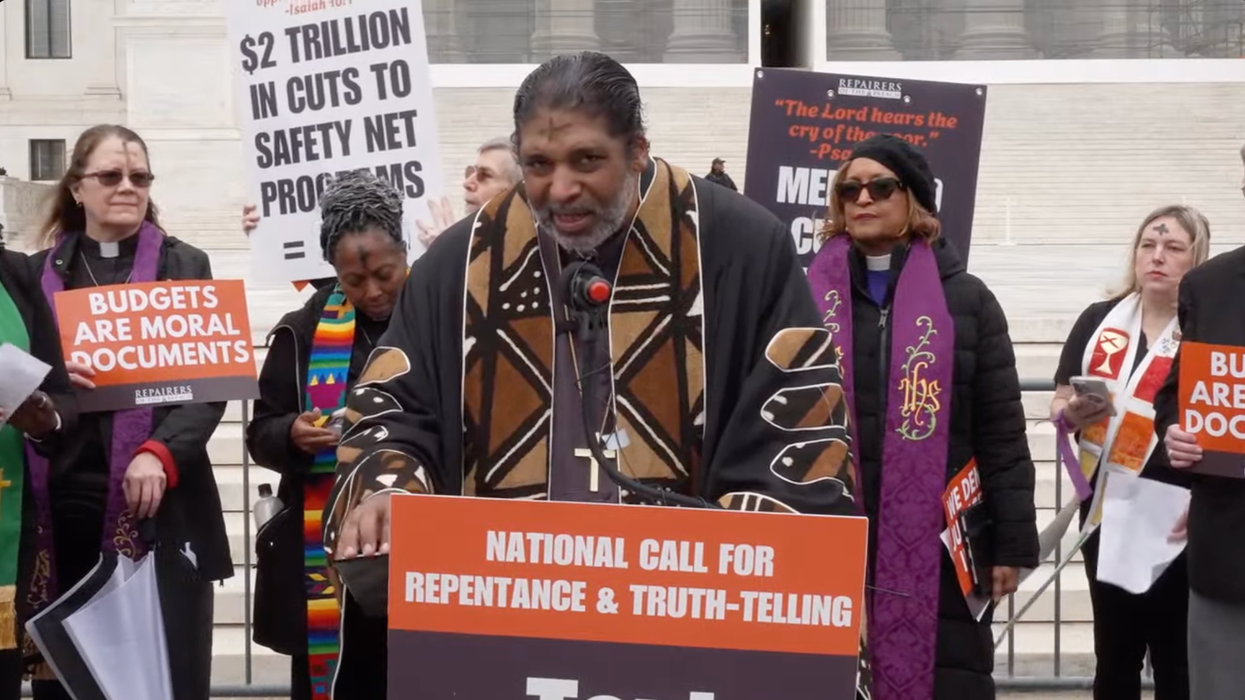Bishop Barber Eulogizes Tens of Thousands of Americans Who Will Die Because of GOP Healthcare Cuts
"We will not let them die ignored," said the Repairers of the Breach president. "We will not let their deaths go unregistered on the conscience of this nation and this state, and among the people."
Surrounded by cardboard "tombstones" that displayed likely causes of death of thousands of people in the United States under Republican policies, Bishop William J. Barber II on Monday gave a eulogy in Raleigh, North Carolina, honoring those who are being directly targeted by the Trump administration's cuts to healthcare, public health funding, and other essential government programs.
The word "eulogy," he said, comes from the Greek word "eulogia," and means "good words."
"But the question is, what is the 'good word' when people shouldn't be dead?" asked the president of the grassroots group Repairers of the Breach and the co-chair of the Poor People's Campaign, adding that the people he was speaking about are projected to die in the coming year solely due to "policy violence."
"We will not let them die ignored," said Barber. "We will not let their deaths go unregistered on the conscience of this nation and this state, and among the people."
Barber spoke at the flagship event of Repairers of the Breach's regular Moral Mondays prayer protest, while supporters in more than 15 states including Alabama, Pennsylvania, Kentucky, Ohio, and Texas also delivered eulogies for those who are expected to die as a result of the $186 billion in cuts to the Supplemental Nutrition Assistance Program (SNAP), $1 trillion in cuts to Medicaid, and funding slashed by the One Big Beautiful Bill Act (OBBBA) that was passed in July.
Roughly 51,000 people are expected to die annually as they lose access to SNAP and Medicaid, as well as those whose healthcare costs will skyrocket if Affordable Care Act subsidies are allowed to expire at the end of the year. People with disabilities and low-income senior citizens are also expected to be impacted by OBBBA provisions that will make it harder for them to access Medicare Savings Programs.
"We are fighting for the life of those who yet remain," said Barber. "When they passed the Big Ugly Deadly Destructive Bill—don't ever call it the Beautiful Bill—when they passed it, it represented a death sentence."
Standing Against Deadly Policy Violence | National Moral Monday Flagship Broadcast 11-24-2025 https://t.co/uFk1mNdse3
— Rev. Dr. William J. Barber II (@RevDrBarber) November 24, 2025
Barber noted that Republicans were able to pass the law after lying about "waste and fraud and abuse" in the federal programs that rely on them for healthcare and food assistance.
"They had to tell a lie to keep their promise to the wealthiest people in America," said the bishop, referring to thousands of dollars in annual tax cuts for the richest households that are included in the OBBBA.
Sloan Meek, who has cerebral palsy and relies on Medicaid, also gave a statement.
"I feel a lot of fear and worry right now that every cut and rate reduction to Medicaid will change my whole life," said Meek. "Having disabilities does not mean I am sick, but it does mean I need consistent treatment and care to stay healthy. I do not want to become sick. I do not want to lose my community. I do not want to lose my voice. I do not want to be forced out of my home to live and receive care from a bunch of strangers. I do not want to die because of a political issue. These are the fears I share with every disabled person using Medicaid in North Carolina right now. I would like to ask every legislator to please see us as having valuable and important lives that are worth supporting."
The event also took aim at the Trump administration's actions weakening the Federal Emergency Management Agency (FEMA)—with the federal government denying and delaying states' disaster assistance requests—and President Donald Trump's mass deportation campaign, which most recently unleashed federal agents on North Carolina communities from Charlotte to Raleigh.
The tombstones that flanked Barber read, "I lost Medicare," "I was disappeared," "I lost medical research," "FEMA did not respond."
“The big, bad, deadly budget bill proved that Washington lawmakers are more than willing to kill tens of thousands of people to line the pockets of the wealthy—but now even that level of destruction and death wasn’t enough,” said Barber in a statement ahead of the event. “Lawmakers are now allowing healthcare subsidies to expire, forcing millions of people to come up with more money for health plans—or die trying. And the Trump administration just unleashed its masked army of ICE agents to terrify and abduct immigrants in Charlotte and Raleigh."
“One of the grandest, cruelest ironies is that many of the leaders greenlighting these deadly policies profess to be Christian. I’m not sure what Bible they’re reading, but my Bible tells me to protect all people—including poor people and foreigners—without condition or judgment," Barber continued. “We cannot stay silent in this moment."
Barber said the event was being held two days before Repairers of the Breach was preparing to send an open letter to every member of the North Carolina General Assembly, calling for the body to hold an "emergency session and vote to tell Congress and the president to take hands off the people of North Carolina, to reverse policies that will hurt 307,000 North Carolinians that will lose Medicaid, that will cause 375,000 to lose food stamps."
On Monday evening, the organization was planning another event to call on Congress and the White House "to immediately cease and desist" their attacks on Latino and immigrant communities across the country, deploying "Liberty Vans": mobile rapid-response command centers staffed by volunteer lawyers and campaigners to provide support to communities targeted by Immigration and Customs Enforcement operations.


